Training courses on domestic violence & Train-the-Trainer courses
Here, you will find reports on our various training courses on domestic violence, specifically designed for healthcare sector. Specialised train-the-trainer courses were done nationally and in English to empower trainers with the skills needed to effectively teach others. You can also download the Train-the-Trainer handbook in English, German, Swedish, Greek, Italian, and adapted to the Austrian context. These handbooks complement our training courses, providing essential guidance and resources for trainers.

VIPROM Train-the-Trainer courses
The Train-the-Trainer (TtT) programme equips trainers with the knowledge and skills necessary to deliver high-quality and culturally sensitive pilot trainings on domestic violence for diverse stakeholder groups across partner countries. Developed using advanced training methods and addressing clinical challenges faced by professionals, the TtT curricula are accompanied by a concise and practical Trainer-the-Trainer handbook. This handbook introduces the didactic concepts of the VIPROM curricula and is available in English, as well as translated versions in German, Italian, Swedish, and Greek, with a special adaptation for Austria.
Germany
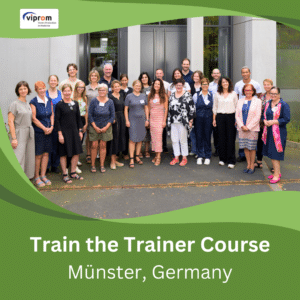 |
As part of the TtT programme, a European workshop was hosted by WWU in Münster, Germany, to ensure consistent and comparable pilot trainings across all partner countries. National trainers learned to navigate the didactic approaches and stakeholder-specific materials, ensuring the programme is delivered effectively within their unique national and cultural contexts.
More information on the VIPROM Train the Trainer Event in Münster can be found here.
|
Sweden
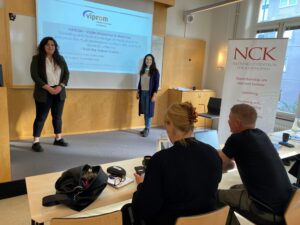 |
On 11th of October, the first part of VIPROM’s training course started in Sweden. Our partner Nationellt centrum för kvinnofrid, Uppsala universitet trained healthcare professionals who will educate colleagues about domestic violence. Among others, participants from the Clinical Training Center, at Akademiska sjukhuset, participated. There were many fruitful conversations, where the future trainers shared valuable insights and reflections on teaching about the sensitive topic of intimate partner violence.
|

Training courses on domestic violence
Our training courses on domestic violence are designed to equip professionals in the medical sector with essential knowledge and tools to address domestic violence effectively. The curricula are built upon the resources available on the modular European Training Platform on Domestic Violence (https://training.improdova.eu/en/). This platform offers a wide range of stakeholder-specific materials and tools, tailored to meet the needs of trainers working with diverse professional groups. Trainers have the flexibility to select content from each module to best suit their audience, with certain materials being mandatory and others optional. This approach ensures a comprehensive yet adaptable training experience, fostering the skills needed to recognise, respond to, and prevent domestic violence.
Germany
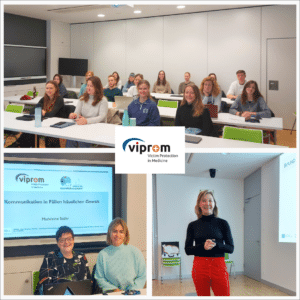 |
In November and December 2024, VIPROM partner WWU hosted two training courses on domestic violence for medical students at the medical faculty of the University of Münster (WWU). The courses, held on 16–17 November 24 and 7–8 December 24 in Münster (Germany), brought together 30 medical students and three experienced trainers for an immersive and engaging educational experience. The courses aimed to equip future physicians with the skills and knowledge needed to recognise, understand, and respond effectively to cases of domestic violence. Through interactive activities such as experiential role-plays, detailed case studies, and collaborative group exercises, participants explored the complexities of domestic violence in a dynamic and supportive learning environment. These courses were evaluated quite well by students: “Personally, I got a lot out of this course, and I can’t remember the last time I followed a course so closely. Many thanks!” They agreed that the course provided them with a deeper understanding of the issue highlighting the essential role of the medical sector in identifying and supporting victims as being door opener for DV victims in the future! |
____________________________________________________________________________________________________________________
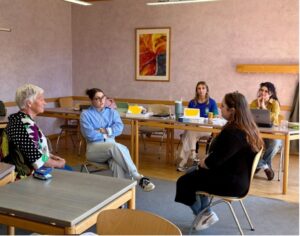 |
On 28 April 2025, the VIPROM project team conducted a full-day training session on domestic violence for nursing students at the Dörte-Krause-Institute, part of the Community Hospital in Herdecke – a rural area in western Germany. Led by experienced trainers from VIPROM partner GESINE Intervention, the session focused on key questions such as: How can healthcare professionals recognise signs of domestic violence in patients? How can suspicions be addressed in a sensitive and appropriate way? What are the next steps once violence is disclosed? The training was attended by eight nursing students in their third year of education, who demonstrated a high level of engagement, openness, and professionalism. Through discussions, exercises, and reflections, the group explored the critical role of nursing professionals in detecting and responding to domestic violence. The session not only strengthened participants’ awareness and competencies, but also highlighted the importance of integrating this topic into health education. It was a strong signal that the next generation of healthcare providers is ready to advocate for safety, dignity, and change in clinical settings. |
Italy
 |
The Italian VIPROM partner AOU in Parma carried out a national training on Domestic Violence using our VIPROM curriculum. The lessons began on October 15 with a total duration of 16 hours. The participants formed a mixed group with physicians, nurses, midwives and psychologists. In working groups, participants were able to immerse themselves in the different clinical situations and tried to give meaningful answers to critical questions. At the end of each day, the participants also asked many questions related to their own areas of work, showing that they were very interested in improving the critical situations they often face in their daily work 👩⚕️ On December 2 and 3 there will be another training course. This is another important milestone to raise awareness regarding Domestic Violence and how best to deal with it in the health care system. |
Greece
 |
HFPA (Hellenic Forensic Psychiatric Association) completed piloting the VIPROM curricula and held with great success the training seminars on Domestic Abuse, within the framework of the European program VIPROM, on the 2-3 and 23-24 of November in Athens, and on the 13-14 of November, in Thessaloniki. A total of 85 participants (medical students, nurses, midwives, health visitors and medical doctors) had a unique training experience, with experiential role-plays, case studies and group exercises, that allowed them to explore in depth the phenomenon of violence and the most effective response to it. Their feedback was totally positive and inspires us to keep up the hard work on training experts, so that we all work together to eliminate domestic and gender-based violence! |
Austria
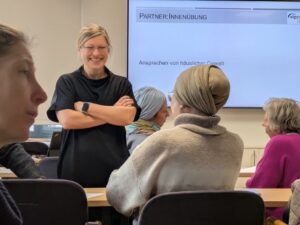 |
On 14 December 2024, 14 medical doctors in Austria completed the first-ever training on domestic violence (DV) using the VIPROM curriculum. Over the course of a Saturday, 11 women and 3 men from diverse medical backgrounds engaged in a comprehensive session led by an expert from Austria’s largest DV-focused hospital unit. The training covered topics from DV basics, such as forms and indicators, to advanced issues like documentation, legal aspects, and inter-agency collaboration. Interactive exercises and role-play brought the curriculum to life, while practical tips—like proper medical documentation for court use—stood out as highlights. More VIPROM trainings are scheduled for January 2025, continuing to build critical skills for addressing DV in healthcare settings. |
Sweden
 |
On 3 December 2024, the first training for emergency doctors and nurses was held at Uppsala University Hospital on domestic violence. The training was held by emergency physicians Karolina Berglund and Louise Eriksson, who also teach in the medical program. Both trainers have taken part of VIPROM’s train the trainer course to be ready to train about this subject. Six emergency doctors and a midwife participated. The interest was great and the commitment clear. Many questions arised in the following areas: Coercive control, warning flags, how to ask patients questions, and how to take care of yourself a time-pressed emergency doctor, but also how bias and prejudices about victims of violence need to be counteracted to give the patients the best care. Another course took place at the woman clinic at Uppsala University Hospital. Six residents in gynaecology and obstetrics of the gynaecological emergency department, and gynaecological Department were trained by Johanna Belachew, director of NCK. |
